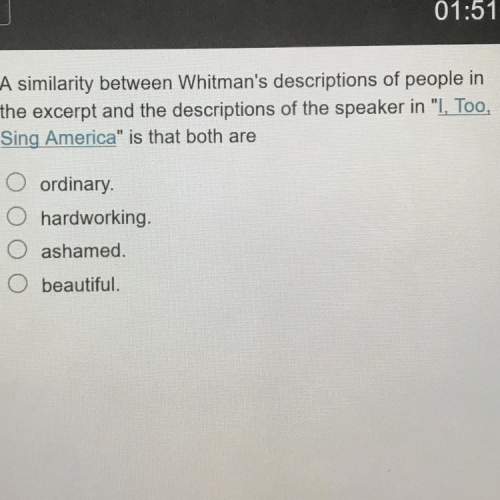
Which excerpt from “the maori: genealogies and origins in new zealand” best shows how the maori perceive their parents?
a) “we should kill our parents,” he suggested, for he was the god of war. “it will be difficult, but it is the only way we can truly be free! ”
b) “we cannot do this,” he said. “rangi and papa are our parents. they have created us, made us who we are.”
c) “the sky father will watch us from above, while the earth mother nourishes us from below.”
d) “it is impossible! ” cried tû. “we should kill them. there is no other way to be free.”

Answers: 2
Other questions on the subject: English

English, 21.06.2019 17:30, shadow29916
Does anyone know the answers to these two? i don’t want to have to guess, you!
Answers: 2

English, 21.06.2019 22:00, hazefreedom3885
How might an author with the opposite attitude rephrase the following sentence? this historic building is a local treasure, with a distinctive exterior and many antiques and fascinating artwork on the inside. choose the correct answer from the following choices, and then select the submit answer button. it's a shame this old building hasn't been torn down yet: its ugly design makes it an eyesore, and it is full of rickety furniture and dusty paintings. this building was built over 100 years ago and features a design not seen on many other buildings of the era as well as a large collection of furniture and art. the old man running the antiques shop watched the kids with suspicion, worrying they would not handle his fragile merchandise with proper care. it is vital that we preserve the history of our town by taking care of buildings like this one, with its interesting design and outstanding collection of art and furniture.
Answers: 1

English, 22.06.2019 00:00, alyssatamayo641
Time is not always change. time can also mean continuity, and it can mean keeping acknowledged truths in mind despite differences in circumstances. there is no better example of this in things fall apart than the retellings of the proverb about the bird named eneke, the language in both retellings is almost identical despite the length of time that has passed between their repetitions. in comparing the usages of the same proverb, achebe allows his readers to note the similarities and differences between the situations, and he them understand how this story can be applied to their own lives.
Answers: 2

English, 22.06.2019 00:00, booooooooooo37
The following question is based on your reading of a midsummer night’s dream by william shakespeare. why does puck transform bottom? a. to disrupt the play. c. to scare the mechanicals. b. for revenge on theseus. d. to scare the lovers.
Answers: 1
Do you know the correct answer?
Which excerpt from “the maori: genealogies and origins in new zealand” best shows how the maori per...
Questions in other subjects:

Mathematics, 04.12.2020 18:20





English, 04.12.2020 18:20



Mathematics, 04.12.2020 18:20

History, 04.12.2020 18:20







